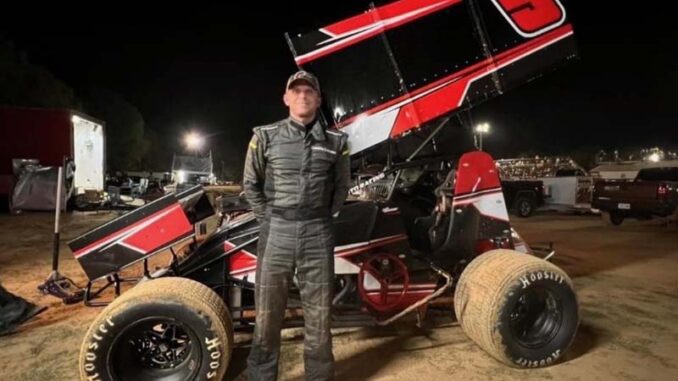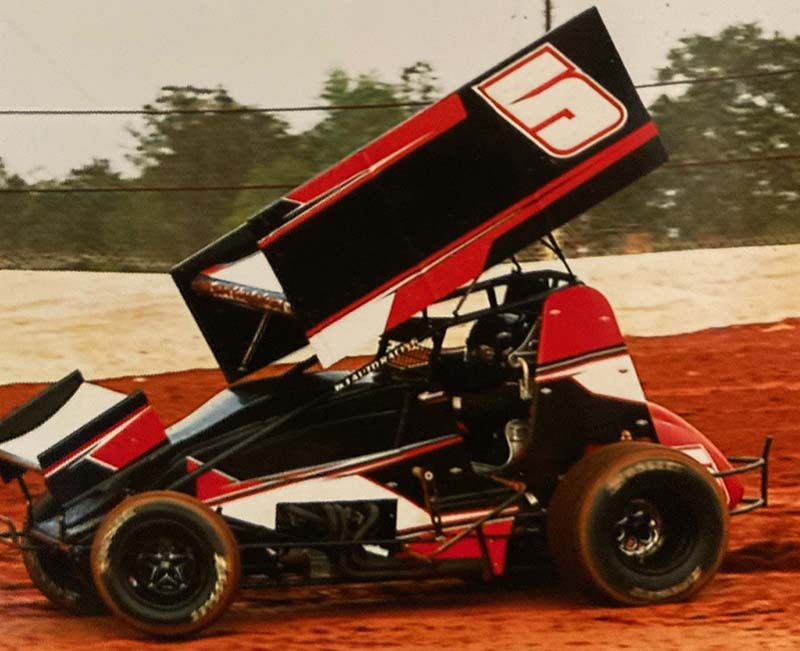
By Ben Deatherage
ABBEVILLE, La. (Apr. 1, 2025) — Cassidy Lejeune is a rising force in the RaceSaver IMCA Sprint Car division, representing Abbeville, Louisiana—pronounced “Ab-bay-ville,” a nod to its French roots, derived from the word “Abbé,” meaning abbot. While many drivers race just minutes from their shops, Lejeune travels hundreds of miles from the bayous of South Louisiana to compete in Speedway Motors IMCA Weekly racing. Fueled by grit, determination, and a deep passion for the sport, he has been turning heads with his recent speed and consistency—and appears poised for a breakthrough win at any time now.
Racing Journey and Transition to RaceSaver Competition
Lejeune’s racing journey began at the age of 10 in go-karts, competing on both asphalt and dirt tracks across South Louisiana. After high school, he moved into the Micro Sprint ranks, racing throughout the Southeast. In 2001, he climbed into a Sprint Car for the first time and has raced on and off in the division ever since.
In 2017, he transitioned into the RaceSaver class and has competed in IMCA-sanctioned events across East and South Texas, primarily making a 3.5-hour trek from Southern Louisiana to 105 Motor Speedway, in Cleveland, where he competes regularly.
Lejeune says the transition to the RaceSaver class has been both fun and challenging.

“It’s been a great experience. It’s different than what I’ve driven before, and I’ve had to relearn how to run the bottom. But it’s a great group of people to run with in Texas.”
In the 2025 season opener on March 15th at 105, Lejeune turned heads with a second-place finish after closing 2024 with a strong third-place result.
“It was a good showing,” Lejeune said. “We started fourth and took the lead a couple laps into the race and held on for several laps before Christopher Townsend got around me on a restart.”
With back-to-back podium finishes, Lejeune is knocking on the door of victory lane. He’s riding a wave of momentum and knows there’s just one more step left to climb—the top spot on the podium.
Degrees, Ducks, and Dedication
While in graduate school, he stepped away from racing for about five years to concentrate on his studies. He attended undergraduate school at the University of Louisiana–Lafayette and later pursued graduate studies at Louisiana State University in Baton Rouge, earning two degrees in environmental science. He currently works for Ducks Unlimited, helping to conserve wetlands in his native Louisiana.
A Family Affair
The Lejeune family finances the entire racing operation themselves with no current sponsors now. His father, Mike, and uncle Brad accompany him on race days, forming a dedicated, family-run pit crew.
“This racing thing my dad got from my grandfather, and I got it from him,” Lejeune shared. “I’m thankful for it, because this has been something he and I have done since I was a kid. We’ve made some really fond memories I wouldn’t trade for the world.”
He also credits his family for their support.
“I also have to thank my wife and kids for allowing me to do this on the weekends—to get away for a day or two and have some fun.”
Cajun Heritage and Local Traditions
Beyond racing, Lejeune is part of a proud Cajun lineage. The British exiled his French-Canadian ancestors from Acadia—a region that includes parts of present-day Quebec, the Canadian Maritime provinces, and Maine—following the end of the French and Indian War in 1763. Many resettled in what was then French Louisiana, establishing the culture now celebrated in modern-day Acadiana.
Abbeville, Lejeune’s hometown, is home to the Giant Omelette Celebration, held annually since 1985. According to legend, when Napoleon’s army rested in Bessières, France, an innkeeper gathered all the village’s eggs to cook an omelet for the soldiers. The tradition later evolved into a charitable act of feeding the poor. Each year, representatives from seven international cities participate in Abbeville’s event, helping to prepare a 5,000-egg Cajun omelet that’s shared freely with all attendees in the town square.
“It’s a bunch of chefs that come in and they have this big skillet in the street and build a big fire and it’s surrounded by a festival and other activities going on around at the same time,” Lejeune explained. “They get together and have a procession in the street and crack a ton of eggs in the skillet and make a big omelet that they share with the community. It’s a great experience with good food with crafts, music, and other things. In South Louisiana they enjoy having a good time and having festivals and events and this is a good one.”
